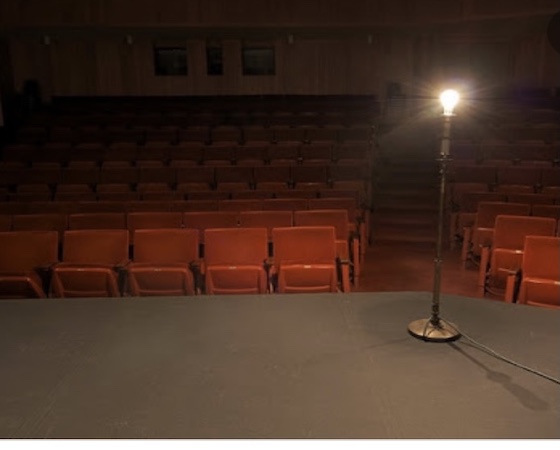Guided By the “Ghost” Light: Tapping Into Theater’s Lessons During Its Absence

When a theater is empty, the tradition is to keep a lone bulb lit on the stage — a ghost light — really for safety, but superstitiously to keep away the bad spirits lurking in the building. Sadly, most theaters right now are lit merely by their ghost bulb, but in the absence of action on stage, I prefer to think of those bulbs as beacons to the rest of us about all that Theater provides, even when performances are temporarily suspended.
We are in a time when the “audiences,” or customers and stakeholders, of businesses are going through constant, dramatic change, and teamwork needs to dynamically adjust, every single day, to the new realities we face. In such a climate, the foundations of Theater provide powerful tools for leaders needing to connect, motivate, and deliver under the spotlight as never before.
In the past, I have talked about the importance of thinking about great business leaders embracing a view more akin to a jazz combo leader than a classical music conductor, inspired by a seminal article by John Clarkeson, the late former CEO of the Boston Consulting Group. Set the structure, assemble great talent, keep the core rhythm going, listen constantly to each other, but let each other innovate in new directions, which if successful, the team will sense and follow. This view is a clear contrast to formally planned, rigorous planning, and leadership through the force of hierarchy.
Theater comes somewhere in between. You still have to present a (usually) written piece, you do need a fair amount of direction to structure how it will happen, you do need someone to frequently provide feedback to keep everyone moving towards a shared vision, but you also let great talent explore new directions and take their energy from the audience. There is much here to teach to business leaders.
Building Leadership Through the Principles of Theater
Since I’ve stepped out independently, I recently started working again with The TAI Group (formerly The Actor’s Institute), whom I credit, years ago, as a key influence in building my own presence, through their tough love approach to leadership development, anchored in the principles of Theater.
The techniques they draw from, those that have been proven to consistently motivate audiences and galvanize production teams, offer a unique view of the priority muscles for leaders to build:
- Start inside. “Unless you learn how to be in your head, you’ll never learn how to create” — Lin-Manuel Miranda. Understand your own critical drivers. What ignites your own passion? Is it the chemistry of people being creative together? Is it the forced march of a team getting a tough job done? Is it bringing out your own ideas for others to explore, adapt, and share? Become conscious of the drivers of your own persona, so you know when to unleash them or control them, depending on your context
- Investigate the context. Probe to understand what is really happening around you. Who is your team and your audience. What is guiding their thinking in a given moment. What metaphors frame their picture of the world in which you are aiming to make a difference. Don’t put your own opinions on it, just see what’s around you for what it is.
- Invite a relationship through a fitting demand. “Explore this clear, emerging customer need with me.” “Rethink the things that make us slow, that are costing us too much, that put us in the same box as our competitors.” With what you now see, knowing what you are capable of catalyzing, make a request that will pull people in. Give them a reason to be in relationship with you. Don’t assume it will just happen. You have to make the demand.
- Engage by unlocking imagination, sustain by making it real. Every day. All great leaders offer a new vision of the future, but, for better or worse, the most effective get those around them actively engaged in making it happen. In business especially, credibility reigns supreme, so ground your sense of the new business launch, new operating model, or new strategic focus in the specific ways your audience will feel it and feed more back into it.
Unlocking Our Personal Creative Energy
Martha Graham said, “Theater is a verb before it is a noun, an act before it is a place.”
At a time when the “places” for theater are merely lit by a lone bulb, we can energize ourselves through the “act” of theater in our everyday lives, professionally, and personally. Gifford Booth, CEO of The TAI Group, likes to say that leaders, and the teams around them, have a latent need to “unlock the transformative nature of their human energy.”
As I now work with the leadership teams of emerging companies and larger enterprises wanting to unlock new energy, especially during this time of unrelenting flux, I have found a ton of value in investing some time to pull the craftwork of Theater back into my core.
And hey, as Sam Shepard said in a dialogue shared by Patti Smith, “Don’t worry if you mess up. It’s like a jazz drummer. If you miss a beat, you just start a new rhythm.”